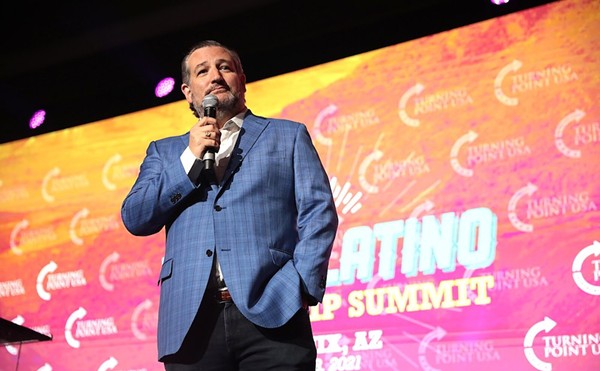Auto-Tune can serve as an additive or a crutch, but it has opened the floodgates for a relentless wave of untalented goons in the mainstream. The constant Auto-Tuning of vocals begets formulated, cookie-cutter artists made to appear talented, causing the mainstream to overflow with a mess of hopeful contenders engineered for a greater likelihood of success. The software doesn't guarantee artistic innovation or celebrity status (although the iPhone application "I Am T-Pain" doesn't hurt your chances), but when the talent is happenstance and the clock is ticking, Auto-Tune can serve as a great equalizer.
The program is the brainchild of Dr. Andy Hildebrand, a former geophysics scientist who realized the significance of his work with autocorrelation (a mathematical process of interpreting the reflections of sound waves sent into the ground to locate potential drilling sites) while doing seismic data research for Exxon. He quit to take classes at Rice U in music composition, then founded his own company, Jupiter Systems (now Antares Audio Technologies), in 1990. The bestselling Auto-Tune software was given life in 1997 and has been a source of sound manipulation and vehement controversy ever since.
Its popularity was epitomized with T-Pain's blatant use of a slower retune speed, nicknamed "The Cher Effect" for her 1998 hit "Believe," (disclaimer: listening to this whole song will make you punch your computer) which used Auto-Tune to create warbled, electronic vocals. T-Pain has used the effect as a mainstay on his tracks and was rewarded with a 2008 Grammy and four nominations in 2009. As is inevitable in pop culture, production teams loaded up the bandwagon and never looked back.
Different from a vocoder, which was originally developed as a means of speech encryption by synthesizing the voice's natural frequencies to produce an electronic recreation, Auto-Tune takes a recording and alters off-key notes by bending them into perfect pitch. The effects can be made discreetly to fix minor flaws or obviously to produce a robotic-sounding voice. A normally unimpressive vocalist has the ability to sing in perfect pitch. It is the impression of talent, bestowed by technology. Madonna, Daft Punk, Marilyn Manson, and Beck (to name a few) use a vocoder to add an electronic effect whereas, for example, Kanye West is notorious for Auto-Tuning during his foray into singing (especially in his most recent album 808s & Heartbreak).
Like many artists, Austinite Ter'ell Shahid of the funk-hop trio Neckbone is frustrated by Auto-Tuning habits, but more than anything he seems nostalgic for real sound.
"When you can hear the depth of the `unaffected` voice, it makes you more attached to the music," he said. "Now you feel further from it, and you are. It's like being around a really pretty person, and you don't know why you're not attracted to them.
"I pray that it's a fad," he continued. "We're using our music as a platform to say that we're okay with you guys having the clown stuff, but don't alienate or exclude the hardcore artists who don't," said Shahid. "There's so much crutching. So much is restricted in the spotlight."
Trends of the Auto-Tune debate have culminated in whether Auto-Tune is progressive or detrimental to the industry. Media have picked up the issue and put it back down again, unable to do much more than either celebrate the ambition and realization of modern technology, invoke conspiracies about the mainstream (guilty), and/or lament the loss of artistic integrity (also guilty).
"Today, any kid with a computer can make music. It totally opens up the music world, but at the same time just waters everything down and makes the overall product less desirable," said vocalist Danny Gibbons of local alt folk-rock group Our Sleeping Giant, together since Gibbons transitioned from a three year-old solo performance to a group effort in February 2009. Together with bassist Jordan Williams, Gibbons produces all of OSG's recordings and asserts that although pro-tools are used, Auto-Tune is not involved in the process. Like Shahid, Gibbons is unmistakably reminiscent for passé production methods.
"I wish I was alive in the early 70s when everything was still analog," said Gibbons. "There's something missing and something to be desired for the warm `analog` recordings."
Boxes of Auto-Tune software are set ablaze in the video for Jay-Z's hit song "D.O.A. (Death of Auto-Tune)" as he proclaims the end of the era of pitch correction. Seemingly born of general frustration for the industry and his peers, the rapper's assertions were preemptive. Despite allegations of overexposure, kitsch, and undermined credibility, Auto-Tune remains an industry constant. Online copies of the software level the playing field, giving Joe Average power over a previously well-kept industry secret.
The fad is not genre-specific. Rap music has been a major player in the Auto-Tuning game, but shamelessly warbled vocals are perhaps less offensive than backdoor tactics disguising less impressive performances. Many well-known artists have used Auto-Tune over the years to discreetly iron out inconsistencies without adding obvious T-Pain-esque electronic effects (Maroon 5, Garth Brooks, Natasha Bedingfield, Uncle Kracker, Britney Spears, the Dixie Chicks, New Found Glory, Rascal Flatts, etc. The list goes on and on). If you know what to listen for, it can be detected. If not, you'd probably never know that the majority of vocals have been at least slightly corrected for radio play. The taboo of Auto-Tune is highlighted by this type of corrective 'cheating,' as opposed to those who use it as an additive stylistic tool.
"The music industry is saturated with artists that go with the popular trends to be heard," said San Antonio-based Etheric Music's Jennifer Chavez, manager of Neckbone. "The days of having to really sing are long gone."
When asked if he thinks his software is evil, Hildebrand didn't falter. "My wife wears makeup, is that evil?" (sic). Sports have long been plagued by players' use of anabolic steroids, blurring the line between true athletic ability and those desperately juicing to compete. Fashion media use technology to airbrush photos, and the taboo of plastic surgery has practically dissipated.
The analogies aren't exact but the deception is comparable. Nobody believes T-Pain actually has a robot voice, but the average untrained ear isn't likely to recognize carefully corrected pitches. And why should it? Mainstream radio is the music lifeline of an unassuming population operating without the desperate need to fine-tune a personal playlist of preferences. To regulate the software would be unfathomable, so those in opposition must learn to detect its use and tastefulness in discerning an artist's validity. Then again, you'd be hard-pressed to find many people willing to exert such an effort when it's so easy not to.
Corrective software may be a quick business fix, but where does it put us in the long run? Artistically and financially bankrupt when the novelty wears off and no real talent has been invested in. Whether a moral debate, a question of taste, or just a passing fad, Auto-Tune is unlikely to cause the complete vacuum for good music. Every popular artist isn't actually industry-engineered robot yet, even if a lot of them sound like it.
"The `Auto-Tune` facade creates new artists who feel like this is what they need to do. You can't sing on the radio if you don't synthesize your voice," said Shahid of Neckbone. "That's pop culture: the definition of what well-produced music 'should' sound like. It's pretty boring. The music industry is business people trying to run art without any artistic knowledge and it's very counter-productive."

















